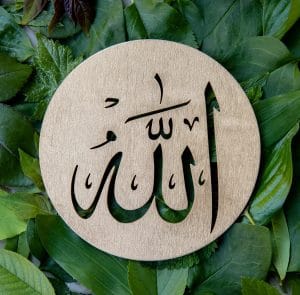What is the Spiritual Practice of al-Wird?
Al-wird (pronounced al weird) is a form of remembrance and a foundational spiritual practice in our Sufi lineage. During al-wird, the seeker repeats four Arabic phrases 100 times each, with the intention to connect with and receive from God. If you wish, you can bring a specific issue or difficulty to this practice with the intention of asking God to heal and transform the negative thought, emotion, belief, wound, etc. Our spiritual guide, Sidi, recommends that the seeker do al-wird twice a day, once in the morning and once in the evening.
The benefits of al-wird are innumerable. Any difficulty you are facing can be at least partly transformed using this practice. Even if you are not consciously working with an issue, have the intention for God to heal and transform you, be as present as you can when discomfort arises

How to Practice al-Wird
- Sit in an upright seated position. Scan your body from head to toe and make sure your whole being is grounded, supported, soft, and relaxed. Note any areas of constriction.
- Close your eyes and turn them inward with a soft and compassionate gaze. If you know the opening prayer (the Fatiha), you may begin by saying it, or you can make any personal prayer that feels right for you.
- Set your intention to return, connect and receive directly from the Divine through al-wird. Setting your intention is very important.
- Repeat the phrase “astaghfirallah al-adhim” aloud 100 times.
It means: “I seek forgiveness from God, the Almighty.” Find the rhythm, tone, and volume that feels effortless and beautiful to you. - Repeat the phrase “la ilaha illahu al-hayy al-qayyum wa atowbu ilayh” 1 time.
- Repeat the phrase “allahumma salli ala sayydina muhammad wa ⁽alihi wa ṣahbihi wa sallim” aloud 100 times.
It means: “Oh God, send Your blessings and peace upon our Master Muḥammad, his family, and his companions.” Find the rhythm, tone, and volume that feels effortless and beautiful to you. - Repeat the phrase “muhammadan rasulullah” aloud 1 time.
- Repeat the phrase “la ilaha illa-llah” aloud 100 times.
It means: “There is nothing worthy of worship but God” Find the rhythm, tone, and volume that feels effortless and beautiful to you. - Repeat the phrase “muhammadan rasulullah” aloud 1 time.
- Repeat the phrase “allah” aloud 100-500 times.
Allah means: “The God” and is the word for God used by all Arabic speakers, whether they are Christian, Jewish, Muslim, etc. Linguistically, the word predates modern languages and is not solely associated with Islam. - Sit in silence and drink from the well of Divine Generosity, Mercy, Kindness, and Love for as long as you wish.
Pronunciation Help
Each sound we utter has a vibration and a frequency. Properly pronouncing these sacred sounds will transmit the energy encoded in the sounds exactly you intended. Here are a couple of examples for you to listen to:
Imam Abdul Karim Pinckney Reciting al-Wird slowly
- “astaghfirallah al-adhim”
- “la ‘ilaha illahu al-hayy al-qayyum wa atoubu ilayh”
- “allahumma salli ‘ala sayyidina muhammadan wa ‘alihi wa sallam”
- “muhammadan rasulullah”
- “la ‘ilaha illa-llah”
- “muhammadan rasulullah”
- Mini al-Wird
Sidi Reciting al-Wird quickly
- “astaghfirallah al-adhim”
- “allahumma salli ‘ala sayyidina muhammadan wa ‘alihi wa sallam”
- “la ‘ilaha illa-llah”
- “Allah”
How to Use Beads and Other Counters in this Spiritual Practice
If you have a set of prayer beads, you are welcome to use them to count your repetitions. Start at the bead adjacent to the largest bead. Recite a phrase and then slide a bead over to the other side of your finger. This is how you count your recitations. Continue to do this until you have repeated the phrase 100 times and slid all 100 beads over.
If you don’t have beads, you can use dried beans as counters instead. You can also use any other small object you have 10 of, or you can use your fingers. Get your counters and place them in front of you before you begin al-wird. Each time you recite a phrase 10 times, move one bean off to the side. Continue doing this until you have repeated the phrase 100 times and moved all 10 beans off to one side.
What Do the Chants Mean?
astaghfirallah al-adhim

- The first phrase, “astaghfirallah al-adhim,” is translated as “I seek forgiveness in Allah, the Almighty.” This phrase is all about turning the eye of your heart back towards Allah, finding our way back to the Love after being distracted by “other than Allah.”
- Saying “astaghfirallah al-adhim” is steeped in mercy and gentleness. It is not about you being bad or wrong, it’s just about becoming lost and then returning to a place of receptivity. It is about hitting the reset button and starting over, returning to our intention to live a holy and divinely-inspired life, and facing the Divine directly. In the model where existence is comprised of 4 different worlds, or levels, called “Mulk,” “Malakut,” “Jabarut,” and “Lahut,” this phase of the journey is considered the world of “Mulk,” the physical world. In the paradigm of islam, iman, and ihsan, this is the station of islam, to return and surrender to God.
allahumma salli ala sayyidina muhammadan wa alihi wa sahbihi wa sallim

- The second phrase, “allāhumma ṣalli ‘alā sayyidinā muhammadan wa ‘alihi wa saḥbihi wa sallim,” is translated as, “Oh Allah! Send prayers and peace upon our master Muhammad and his family and his companions.” Once we have become reoriented and turned towards Allah, this next phrase is meant to help us open to connect with the Muhammadan Light. Through this phrase we begin to travel through the worlds towards the Divine. In the model where existence is comprised of 4 different worlds, or levels, called “Mulk,” “Malakut,” “Jabarut,” and “Lahut,” this phase of the journey is considered the world of “malakut,” the world of images. In the paradigm of islam, iman, and ihsan, this is the station of iman, faith, in which we are receptive to receive the mercy and peace of God.
la ilaha illa-llah

- The third phrase, “la ‘ilaha illa-llah,” literally translates as, “There is no god but God.” “There is nothing worthy of worship other than God,” “There is nothing other than God,” and “Nothing exists outside of God” are also valid translations.
- At this point you are arriving at the threshold of the Presence of Allah. Now you are witnessing and confirming the truth that there is nothing other than Allah, yet there is still your own presence that is witnessing Mu the Truth. In the model where existence is comprised of 4 different worlds, or levels, called “Mulk,” “Malakut,” “Jabarut,” and “Lahut,” this phase of the journey is considered the world of “Jabarut,” the world of subtle energy. In the paradigm of islam, iman, and ihsan, this is the station of iḥsan, spiritual excellence, worshiping God as if you see Him.
allah

- The final stage of the journey of al-wird is about arrival to the world of “Lahut” and the state known as “fana’,” annihilation of your individual presence into the Essence of God. Here, there is no traveler that is witnessing, there is only Allah. Here, the Name begins to repeat itself from itself until the presence can bear no more and begins to return, to “baqa,” to carry the message of the Divine back through the worlds and into this world.
Summary of How to Do al-Wird
- astaghfirallah al-adhim (100x)
I seek forgiveness in Allah, the Almighty
la ilaha illahu al-hayy al-qayyum wa atowbu ilayh (1x)
There is no God but He, the Living, the Everlasting, and to Him I return in repentance. - allahumma salli ala sayydina muhammad wa ⁽alihi wa ṣahbihi wa sallim (100x)
Oh Allah! Send prayers and peace upon our Liege-Lord Muḥammad and his family and his companions.
muhammadan rasulullah (1x)
Muḥammad is the Messenger of Allah. - la ilaha illa-llah (100x)
There is nothing worthy of worship except God.
muhammadan rasulullah (1x)
Muḥammad is the Messenger of Allah. - Allāh (100 or 500x)
- Sit in silence and drink from the well of Divine Generosity, Mercy, Kindness, and Love for as long as you wish.